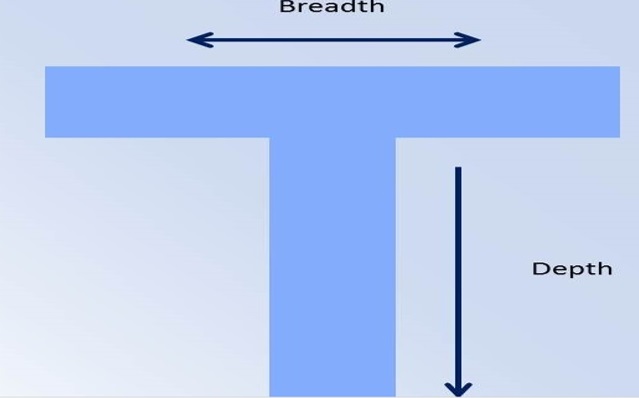There’s often been a debate about which path is best to pursue; the generalist who is adept, flexible and adaptable to the ever-changing digital landscape, or the dedicated specialist who has spent years, or decades honing her craft to a fine skill. Essentially it is a battle between breadth and depth.
My personal views on specialists have been made clear previously – tl;dr – unless you are desperately passionate about a specialised career that requires a tertiary education as a pre-requisite (think Doctor or Lawyer) – I wouldn’t bother. I think the idea of being categorised/defined by your job is self-limiting and constrains your thinking to one paradigm.
My gripe with pursuing a specialised career is the tunnel-vision that can be developed, leading to departments or individuals working in silos. While this is still the case in many big monolithic organisations – the changing nature of the workforce has seen demand trend away for these ‘silo workers’.
However, do I believe the jack of all trades is the way to go? Well, not necessarily.
You need to have one skill-set that acts as your anchor. One that you are known for for within your organisation, and can be totally relied upon.
“But Allan you hypocrite, you just said being a specialist was counter-productive to being an entrepreneur!”
Well, yes – but the difference here is you pivot once you reach ‘skill saturation’, or specialisation. Instead of doing the same skill-set for 20 years, you’re doing it in a quarter of the time and broadening your skill-base to massively increase your value and effectiveness within an organisation. In other words, we all need to become ‘generalising specialists‘, with a T-Shaped Skill-base.
To put my marketing hat on – when a channel becomes completely saturated, are you going to continue to invest marketing dollars into it, despite the shrinking returns? God no – you are going to do some research and find better, up-and-coming channel(s) that will deliver a superior ROI. The same is true for your skill-set. Nothing is lost, as the skills and experience gained from running the previous channel will be transferable.
For some reaching ‘skill saturation’ takes 3 years, for others 7 years. Contrary to popular belief I don’t believe reaching this level should take any longer than a decade. Courses, hands-on experience and mentors if all utilised where possible will massively accelerate your learning.
Fun-fact – did you know Salvidor Dali was a generalising specialist?! He helped design the chuppa chop logo and even build furniture.
You will know you’ve got a solid grasp of your skill-set when you begin to hit the ‘ceiling’, in other words your learning curve begins to plataeu dramatically and you feel more comfortable with even the most advanced tasks. That’s exactly when you need to branch out and learn new, complementary skills relevant to your industry.
I see the future strongly valuing the T Shape Skill-set. In most startups you are required to wear a number of hats. Work in marketing? Expect to know SQL so you don’t need to hassle the dev team to query your database. Work in Ux/Design? Expect to know HTML/CSS to tweak that landing page without hassling the dev team. Work as a developer? (You get the picture…). A T-shaped skill-set makes it possible for cross-pollination of ideas with other departments and is critical in understanding how your work and role enables the business to function as a whole.
So to answer the question of generalist vs specialist – I would say both – the generalising specialist.
Related Articles
How Automating Tasks Preserves Willpower
Willpower or self-control is the ability to delay short-term gratification for long-term gain. It is what separates those who are 'successful' from those who are not. Research has shown that willpower is like a muscle - if you overwork it fatigues. This leaves you...
Hunger Beats Experience When Changing Careers
Experience when changing careers can be daunting at first. However if I had an option of choosing between working with an experienced, jaded, unmotivated person or an inexperienced, hungry, ‘plenty-to-prove’ person – the latter would win hands down. Sure, it might...
Entertainment vs Education
Looking at the amount of time and money you spend on activities that are classified as entertainment compared to educational reveals A LOT about a someone's habits. Otherwise known as the EvE ratio (credit to Peter Voogd), it provides insight into how effectively you...





